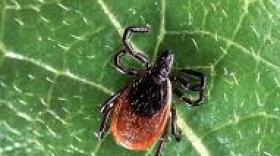State lawmakers hosted a forum in Glens Falls to raise awareness of Lyme disease in upstate New York today. The forum featured presentations from experts on the disease and its transmission.
Attendees packed the auditorium at the Crandall Public Library to hear from a panel of experts on the increasing prevalence of Lyme disease in New York. Presentations covered the disease and current research on tick-borne illness, and suggestions were made about what the state and federal government could do prevent infection in humans.
Recently, the Centers for Disease Control and Prevention revised its estimate for yearly cases of Lyme in the U.S. from 30,000 to 312,000.
Dr. Bryon Backenson, an epidemiologist and research scientist with the New York State Department of Health said that since the state first started tracking the illness in 1985, Lyme has become common throughout much of the state.
"Over the past 30 years basically we've seen Lyme march its way further north and further west across New York State," said Backenson. "The leading edge of Lyme Disease is roughly a band between Syracuse and Rochester and stretches down to the Pennsylvania border. Here in the Capital District and north of the Capital District we see lots of Lyme Disease cases, it's relatively easy for us to catch deer ticks that we couldn't catch in this particular area 25 years ago."
Several of the attendees at the forum claimed to have had experiences with the disease. Chandra Eldridge said she first contracted it seven years ago, and said she has yet to have many of her symptoms disappear.
"I've been antibiotics now - this term has been about a year," said Eldridge. "When I go off it for a couple weeks, I feel the symptoms come back."
Lyme disease is known to be carried by the black-legged deer tick, and can cause persisting fatigue and joint pain. Holly Ahearn, an associate professor of microbiology at SUNY Adirondack challenged some of the conventional knowledge associated with tick bites and Lyme Disease, and questioned the traditional treatment method of administering antibiotics as way to eliminate the disease.
"There's a significant body of evidence that says persisting symptoms are actually caused by persistence of the organism after antibiotics," said Ahearn.
Ahearn also suggested that federal funding for Lyme research, which currently is around $25 million per year, be increased as the disease is becoming more common and understandings of the disease are evolving.
Dr. Timothy Sellati, a researcher from the Trudeau Institute in Saranac Lake, said he hopes a vaccine can be developed to not only fight tick-borne illness, but specifically target the ticks feeding cycle to prevent transmission of the disease from vector to host.
"So if you could vaccinate individuals to mount a protective immune response against the ticks' salivary proteins. This could prevent them effectively feeding," said Sellati.
Senator Betty Little of Queensbury, who helped organize the forum, said the state legislature will create a task force to study tick-borne illness, and that she believes legislation should be passed to introduce more funding for disease research, and to require health insurance companies to cover treatments associated with symptoms of Lyme and other diseases.
"Because if you're sick I don't understand why your insurance isn't covering you," said Little.
The forum also was organized by Assemblymen Dan Stec and Tony Jordan.






